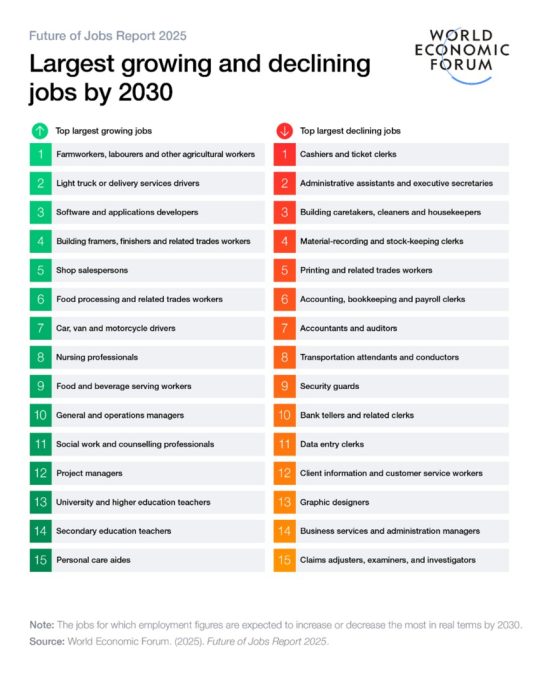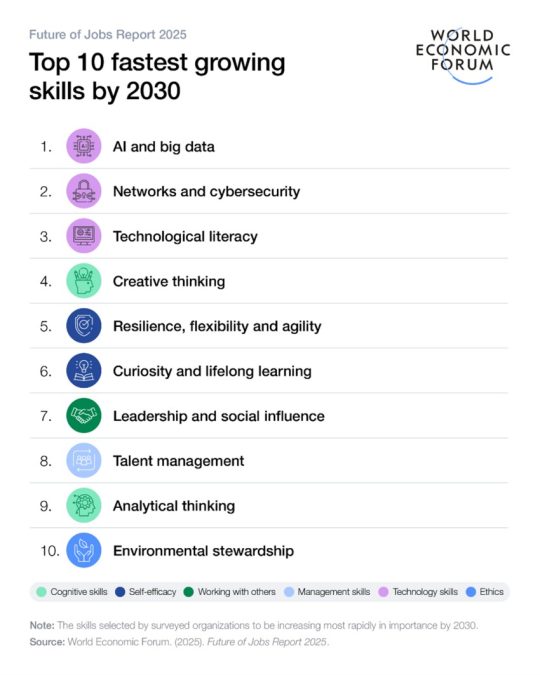Cologny, Switzerland – The World Economic Forum’s Future of Jobs Report 2025 offers a detailed outlook on the evolving global labor market, revealing significant transformations driven by technological advancements, demographic shifts, economic pressures, and the green transition. The report, based on data from over 1,000 companies across 22 industries and 55 economies, forecasts the creation of 170 million new jobs by 2030, alongside the displacement of 92 million roles, resulting in a net increase of 78 million positions.
Major Shifts in the Job Market
According to the report, global job disruption will affect 22% of the workforce by 2030. Roles in technology, data, and artificial intelligence (AI) are expected to see exponential growth, while traditional positions such as cashiers, administrative assistants, and graphic designers are projected to decline due to automation and generative AI.
“Trends such as generative AI and rapid technological shifts are upending industries and labor markets, creating both unprecedented opportunities and profound risks,” said Till Leopold, Head of Work, Wages, and Job Creation at the World Economic Forum. “The time is now for businesses and governments to work together, invest in skills, and build an equitable and resilient global workforce.”
Frontline roles, including farmworkers, delivery drivers, and construction workers, are poised to see the largest growth in absolute terms. Demographic trends are also driving demand for care jobs, such as nursing professionals, and education roles, such as secondary school teachers. Meanwhile, advances in renewable energy and AI are reshaping the demand for specialist roles in these fields.
The Growing Skills Gap
One of the most pressing challenges identified by the report is the widening skills gap, with 63% of employers citing it as a significant barrier to transformation. The report estimates that 59% of the global workforce will require reskilling or upskilling by 2030, but 11% of these workers may not receive the necessary training. This translates to over 120 million individuals at risk of redundancy.

Technology skills in areas like AI, big data, and cybersecurity are expected to experience the fastest growth in demand. However, human skills—including analytical thinking, resilience, flexibility, and collaboration—will remain crucial. Many future roles will require a combination of both technological and interpersonal skills.
Impact of AI on Employment
The adoption of AI is set to transform business models globally, with 50% of employers planning to target new opportunities stemming from AI advancements. However, 41% also anticipate reducing their workforce due to automation. To mitigate the impact, nearly half of employers intend to transition staff affected by AI disruptions into other parts of their business, providing an opportunity to address skills shortages and reduce unemployment risks.
Upskilling remains the preferred strategy for workforce adaptation, with 77% of employers planning initiatives to enhance their employees’ skills.
Economic and Demographic Drivers
In addition to technological advancements, economic pressures and demographic trends are reshaping labor markets. Rising costs of living and slower economic growth are projected to displace six million jobs globally by 2030. At the same time, aging populations in high-income countries are increasing the demand for healthcare professionals, while expanding working-age populations in lower-income regions are driving growth in education professions.

Geopolitical tensions and industrial policy shifts are also affecting labor markets, with 34% of businesses highlighting geopolitical concerns. Trade restrictions and reshoring strategies are reshaping global supply chains and increasing the need for skills such as cybersecurity and adaptability.
Urgent Call for Action
The Future of Jobs Report 2025 emphasizes the need for immediate and collective action across governments, businesses, and educational institutions. Bridging the skills gap, investing in reskilling and upskilling initiatives, and creating accessible pathways to high-growth roles are critical priorities to ensure an equitable transition for workers worldwide.
By focusing on inclusive workforce strategies, stakeholders can build a resilient and adaptable global labor market. As Till Leopold notes, the key to thriving in the jobs of tomorrow lies in collaboration and proactive investment in human capital.
WEF’s Initiatives for Workforce Transformation
The World Economic Forum is actively addressing these challenges through its Reskilling Revolution, which aims to equip one billion people with better education, skills, and economic opportunities by 2030. Additionally, the Jobs Initiative engages governments, businesses, and civil society to prepare workers for dynamic job transitions and harness the potential of AI and green technologies.
The report’s findings will be a focal point at the upcoming World Economic Forum Annual Meeting 2025 in Davos-Klosters, where global leaders will convene to discuss strategies for sustainable and inclusive growth in an era of rapid technological change.








